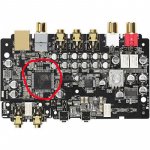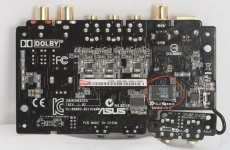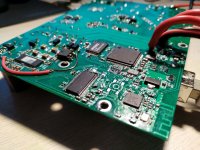Hi
Yes, I work with CM6631A. The configuration tool can not work with CM6632A is because configuration tool only configurate 2 channel. For multi-channels there can be more combination. Some vendor use 2 channel codec + 6 channel codec. Some vendor use 8 channel codec. It is very hard to write a configuration tool to fit all combination.
So I think the best way for CM6632A is to write a customer firmware by vendor.
You mean to order the firmware from the manufacturer of the chip itself? Have a C-MEDIA company?
Hi
The vendor means manufacturer, like ASUS, Sony, Pioneer etc. C-Media have CM6632A firmware for CM6632A demo board. You can use open source sdk to build demo board firmware.
The vendor means manufacturer, like ASUS, Sony, Pioneer etc. C-Media have CM6632A firmware for CM6632A demo board. You can use open source sdk to build demo board firmware.
You mean to order the firmware from the manufacturer of the chip itself? Have a C-MEDIA company?
Hi
It should not work. Because ASUS U7 has special version driver for it. It has some customize feature like output switch, software volume, input switch ... etc. More important is ASUS U7 has some audio effect on it. If driver identify the chip is not U7 the driver shall not start or can not install.
It should not work. Because ASUS U7 has special version driver for it. It has some customize feature like output switch, software volume, input switch ... etc. More important is ASUS U7 has some audio effect on it. If driver identify the chip is not U7 the driver shall not start or can not install.
What do you think, if try to install the driver from the ACS U7, it also has 6632 with memory, like additional chips identifying the U7 is not visible on the board. What do the drivers think?
Hi
For firmware you do not need I2C EEPROM. It use parallel flash memory to store firmware. In Open source SDK it do not access I2C EEPROM. it is not necessary.
For firmware you do not need I2C EEPROM. It use parallel flash memory to store firmware. In Open source SDK it do not access I2C EEPROM. it is not necessary.
Tdtsai, on some cards, specifically DACs, apart from flash memory I have seen an extra eeprom small i2c chip. Is this eeprom necessary in basic configuration, using shared open source SDK?
CM6631A USB to I2S issue
Hi Guys,
I am using LJM CM6631A module connected to DSP board called NAJDA WAF-Audio, but I get the sound only from the LEFT channel. Any idea what to look for in CM6631A settings? Wiring is correct and data signals look good too when checked with the scope.
Hi Guys,
I am using LJM CM6631A module connected to DSP board called NAJDA WAF-Audio, but I get the sound only from the LEFT channel. Any idea what to look for in CM6631A settings? Wiring is correct and data signals look good too when checked with the scope.
Hi! I have a CM6631A based USB to I2S converter, and i would like to use it with a TDA1543 at 192kHz 16 bit. Since the TDA1543 supports 9.2MHz BCLK, i would need a 16 bit frame. But it seems like the CM6631A outputs 32 pulses at the BCLK even for 16 bit data, which unnecessarily doubles the BCLK. Is there any firmware that can help me achieve my goal?
Hi! I have a CM6631A based USB to I2S converter, and i would like to use it with a TDA1543 at 192kHz 16 bit. Since the TDA1543 supports 9.2MHz BCLK, i would need a 16 bit frame. But it seems like the CM6631A outputs 32 pulses at the BCLK even for 16 bit data, which unnecessarily doubles the BCLK. Is there any firmware that can help me achieve my goal?
IanCanada's I2S-to-PCM board can do the conversion for you. You may select 16/18/20/24bit output.
IanCanada's I2S-to-PCM board can do the conversion for you. You may select 16/18/20/24bit output.
Hi! Yes, i know that, however i am thinking on a DIY friendly solution. Is there a S/PDIF receiver that can support 32fs for 16 bits of data? I mean, this 64 bit frame exists on the I2S BCLK, but i don't know if the same is true to the S/PDIF output as well.
Hello altor;
Get a copy of SimpleHID program. With the device plugged in USB and USB is recognized (driver or not) you can get Vendor and PID information. On the bottom of the page select "Info" and get the build string. The core technology is fall back to USB1.0. The USB can appear as 2.0 on port and be 1.0 by speed causing the erratic behavior you describe. In my software it is me making silly mistakes that slow down the USB read/ write. A generic C-Media USB driver should work. In win98 you won't get special functions that way but at least you will know if the product can speak bytes and not just BITES. Also physical connector and cables. C-Media supplies the hardware reference Https://www.cmedia.com.tw/support/download_center just find the correct unit at the bottom of the page.
Get a copy of SimpleHID program. With the device plugged in USB and USB is recognized (driver or not) you can get Vendor and PID information. On the bottom of the page select "Info" and get the build string. The core technology is fall back to USB1.0. The USB can appear as 2.0 on port and be 1.0 by speed causing the erratic behavior you describe. In my software it is me making silly mistakes that slow down the USB read/ write. A generic C-Media USB driver should work. In win98 you won't get special functions that way but at least you will know if the product can speak bytes and not just BITES. Also physical connector and cables. C-Media supplies the hardware reference Https://www.cmedia.com.tw/support/download_center just find the correct unit at the bottom of the page.
Is there a S/PDIF receiver that can support 32fs for 16 bits of data? I mean, this 64 bit frame exists on the I2S BCLK, but i don't know if the same is true to the S/PDIF output as well.
I've searched amongst several S/PDIF receivers (Cirrus/Wolfson, AKM,TI) and have not found one that outputs 32fs and 16bits per channel. They all output 64fs and 32bits.
I have to share my cm6631A(N-mosfet only for cm6631) project because I've found reliable and useful info about this chip only here, chinese and russian DIY area. Nothing from cmedia, really zero.. quite weird company ))
CM6631A (3-11-2018 12-47-19 PM).zip — Yandex.Disk

Untitled-1.jpg
CM6631A (3-11-2018 12-47-19 PM).zip — Yandex.Disk

Untitled-1.jpg
Wow, this looks good. Had the same experience with CMEDIA, the support team is very slow, and they never ever answer my questions properly.
Did you build this? How is it that you have left the microcontroller connected to the I2C out from the design?
Did you build this? How is it that you have left the microcontroller connected to the I2C out from the design?
I have to share my cm6631A(N-mosfet only for cm6631) project because I've found reliable and useful info about this chip only here, chinese and russian DIY area. Nothing from cmedia, really zero.. quite weird company ))
CM6631A (3-11-2018 12-47-19 PM).zip — Yandex.Disk

Untitled-1.jpg
neptunes4you, yes I did, see attached pic. There is a slightly different project (tas5558+tas5624+LLC SMPS +BLE IOS/Android app control, PCBA 139x100x27mm) but due to low impedance GND plane, 6631A works stable even being close to hard switching nodes of class D stage.
Attachments
neptunes4you, yes I did, see attached pic. There is a slightly different project (tas5558+tas5624+LLC SMPS +BLE IOS/Android app control, PCBA 139x100x27mm) but due to low impedance GND plane, 6631A works stable even being close to hard switching nodes of class D stage.
Super cool! And i assume you have uploaded the firmware with the CMEDIA firmware tool right?
No, all those tools, I've got from the current thread, I don't remember the page yet, pls try to use search.
Yes, i think we are talking about the same apps. One is a firmware generator, and the other one is the firmware uploader.
- Home
- Source & Line
- Digital Line Level
- CM6631 usb audio interface .... any good?


